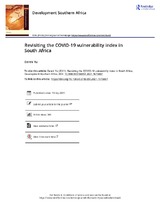| dc.description.abstract | This study uses the Census 2011 and Community Survey 2016 data,
adopts the Alkire-Foster multidimensional poverty index (MPI)
approach and addresses numerous shortcomings of the original
Statistics South Africa method by including numerous indicators
from four dimensions (socio-economic, demographic, housing
and hygiene, health) to derive a revised COVID-19 vulnerability
index. The empirical findings indicate the index was relatively
higher for African female individuals living in rural areas of the
Eastern Cape, KwaZulu-Natal and Limpopo provinces, coming
from households headed by elderly aged 55 years or above.
Alfred Nzo, Amathole, Harry Gwala, OR Tambo and Umzinyathi
are the five district councils that are most vulnerable to COVID-19
(the first four were declared COVID-19 hotspot areas by the South
African government in December 2020). The results of the index
decomposition found that indicators from the housing and
hygiene dimension contributed most to the COVID-19 vulnerability. | en_US |

